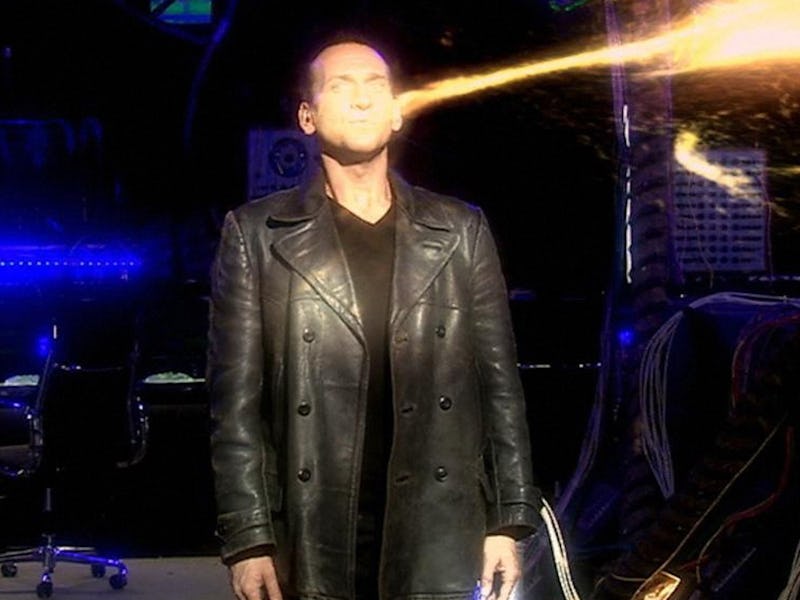Doctor Who’s First 21st Century Finale Set An Impossible Standard
"The Parting of the Ways" changed sci-fi TV finales forever.

Today, season finales of science fiction shows are almost always epic. From massive space fleets in various Star Trek season finales, to the big blow-outs in season finales in Foundation, even the most subtle sci-fi shows like to go big at the end. And, in the 21st century, one show that set the standard for massive and epic season finales is the one show that didn’t actually need to go big at all.
Twenty years ago, on June 18, 2005, after a massive cliffhanger called “Bad Wolf,” Doctor Who dropped the finale of its rebooted “Season 1” in an epic episode called “The Parting of the Ways.” This finale channels aspects of Aliens, Star Trek: The Next Generation, and, of course, throws the entire classic Who canon kitchen sink in the mix, too. It’s also aged particularly well, and feels harder-edged and more serious than many of the equally beloved Who finales that followed it. Here’s why “The Parting of the Ways” holds up 20 years later, and also why it was such a tough act to follow.
Following the revelation that the Daleks are ascendant, the Doctor (Christopher Eccleston) makes a last stand on the space station Satellite Five, 200,000 years in the future. What began as a goofy two-parter about deadly game shows in the future with “Bad Wolf” morphs into a much bigger battle, in which the Doctor sends Rose (Billie Piper) back to contemporary Earth, while he teams up with Jack (John Barrowman) and an assortment of desperate humans, including, memorably, Lynda (Jo Joyner), a doomed ally who is destined to perish, fighting with the Doctor.
Showrunner Russell T Davies gives future-tense humans machine guns and impossible odds, making the relentless Daleks more terrifying than they’d ever been in the various seasons of Doctor Who from the previous century. There are moments in which this episode feels like a lower-budget version of the earliest scenes in The Terminator, and Davies gives us plenty of casualties, and even tells us the future Earth will be utterly bombed by the Daleks. The stakes feel much higher than they should be, and nearly every single Who finale that dealt with the Daleks after this one suffered from just how hardcore this episode was.
On top of this, we’ve learned that like the Borg, the Daleks brought themselves back to life by harvesting human bodies, making this version of the Doctor’s greatest enemy more grisly and horrific than ever. (Davies is also nodding to the 1st Doctor adventure “The Dalek Invasion of Earth,” by showing humanity utterly overwhelmed.)
This creates a massively impossible choice for the Doctor: he has to annihilate all the humans on Earth to stop the Daleks, too. “Die as a human, or live as a Dalek,” the Doctor says of this impossible choice, which, essentially, predicts much of the Time War storylines in later seasons, including, memorably, “The Day of the Doctor.”
All of this action is intercut brilliantly, with Rose back on Earth, grappling with being taken out of the fight, and then, fulfilling a paradox and morphing into an entity called “Bad Wolf” who, we learn, retroactively, has been a type of guardian angel for the characters throughout the season. Rose’s emergence from the TARDIS at the end of the episode is, without a doubt, the most epic moment in modern Doctor Who, and with her glowing eyes and power over time and space, she becomes a Dune-like figure, wielding power to control all of history.
Rose absorbs the “Heart of the TARDIS.”
This moment, of course, leads to the 9th Doctor’s regeneration into a new incarnation, since he has to absorb the power of the time vortex to save Rose’s mind from being utterly destroyed. “My head is killing me,” Rose utters, before the Doctor kisses her, takes the time vortex away, and... becomes a new man.
In the years that followed, various Who finales remixed events like these into epic moments, sometimes resulting in the regeneration of the Doctor, and sometimes not. But, 20 years later, there’s something about this finale that even some of the best finales of the modern era, like “The Big Bang,” lack. It's raw and purer than some of the finales that came later. Infamously, offscreen tensions between Eccleston and Davies led Eccleston to leave the show after just one season, but, in some alternate universe, if the 9th Doctor hadn’t become the 10th, this episode would still be incredible.
Today, because of the massive popularity of David Tennant’s 10th Doctor, this episode is arguably famous for the wrong thing. Yes, this is how we got the 10th Doctor, but that’s not what makes the episode great, nor the best twist. Instead, the true twist of this episode is that Rose is the ultimate hero of the series, and that the Daleks are defeated by a massively powerful time paradox. Doctor Who arguably entered its true golden age after this episode, but in terms of a gritty and heart-wrenching season finale, “The Parting of the Ways” proved nearly impossible to top.